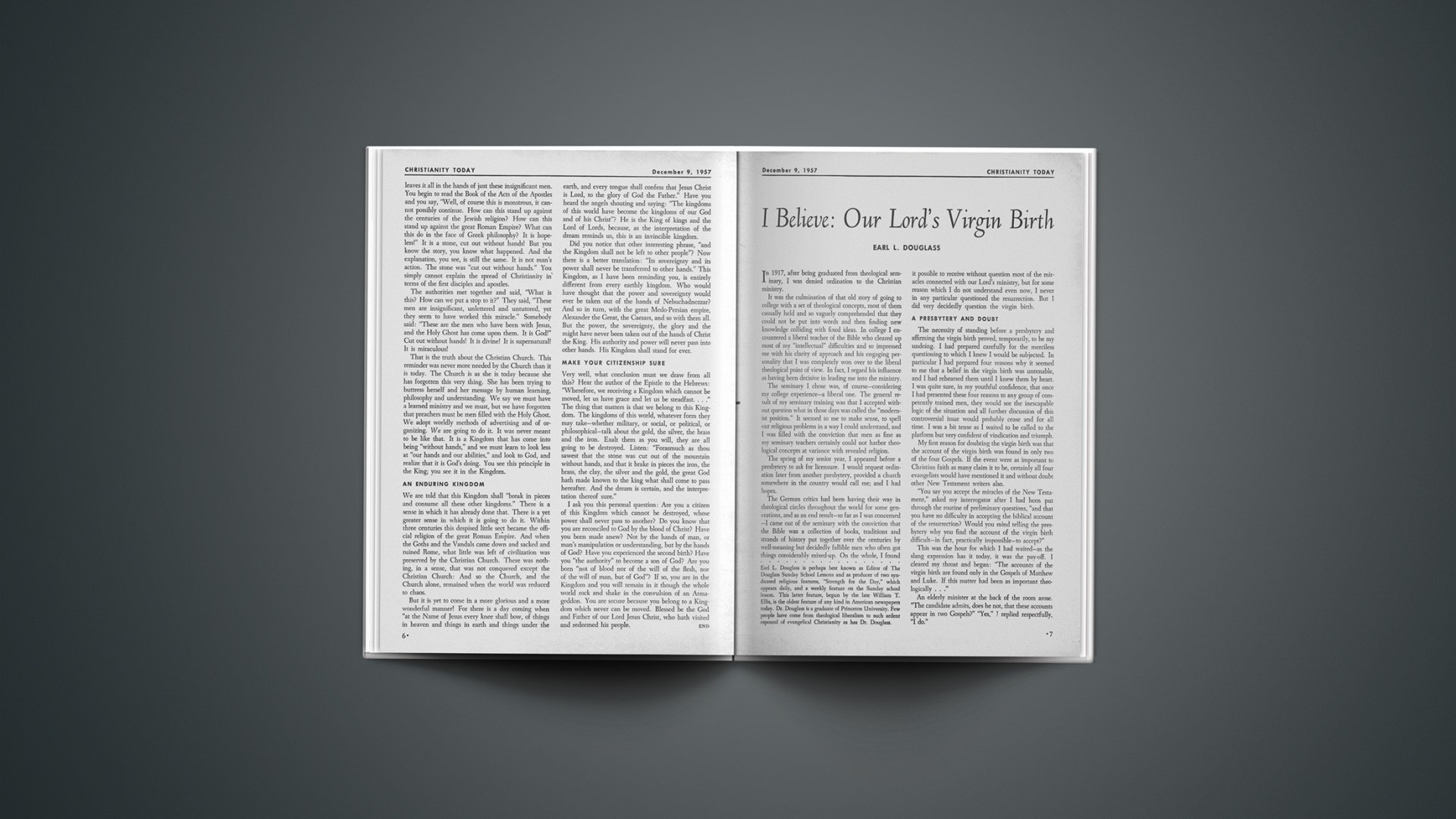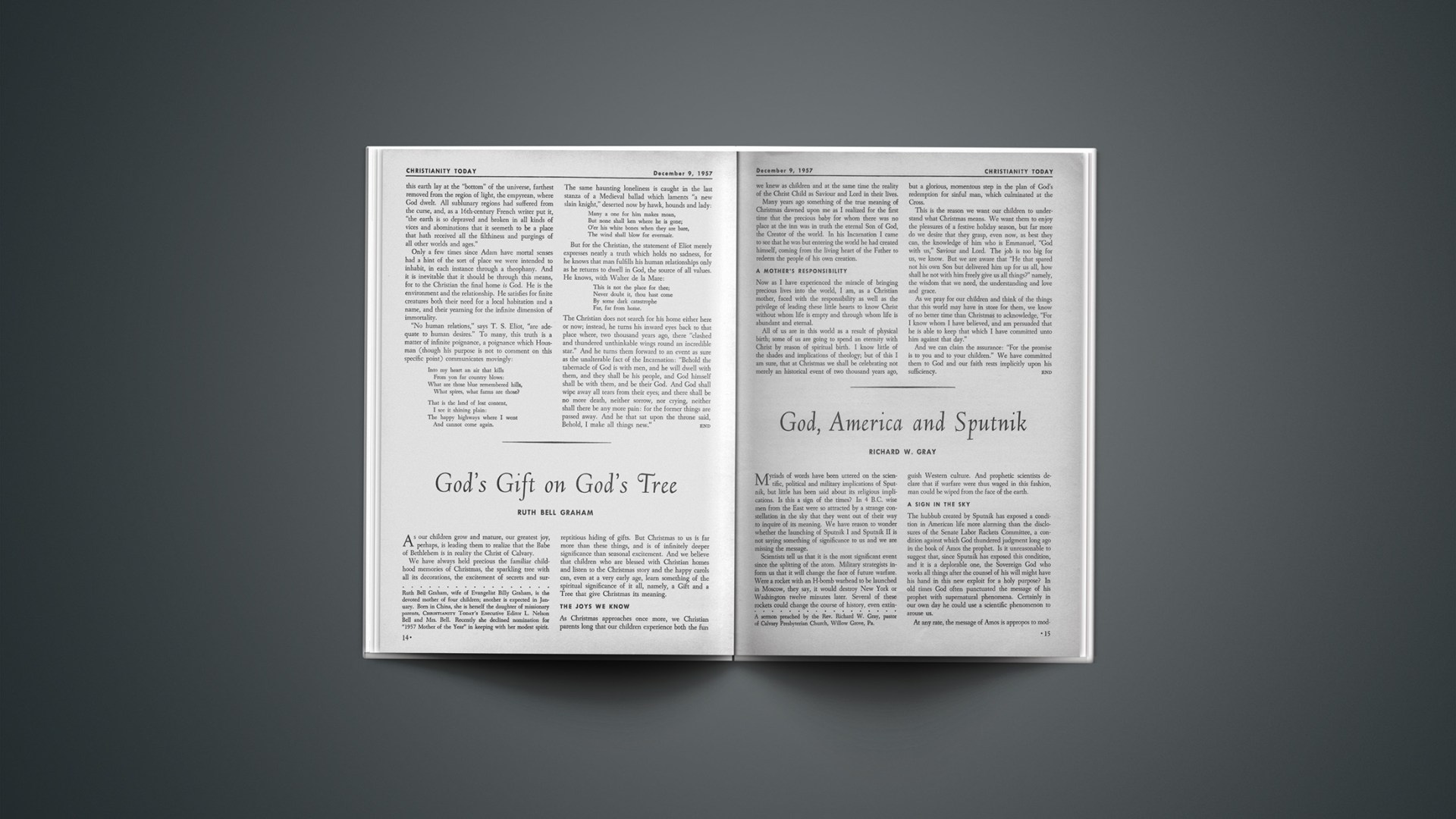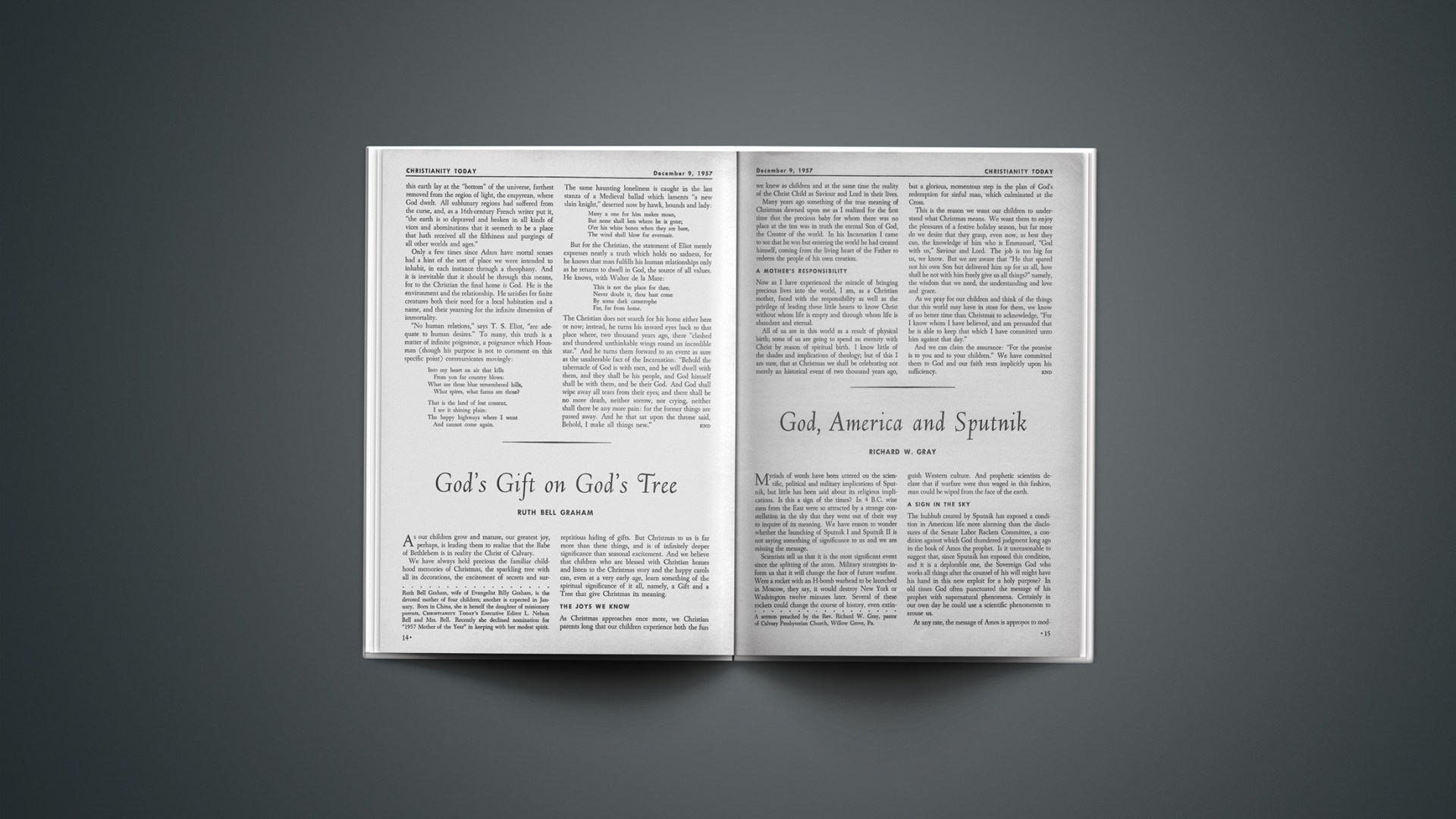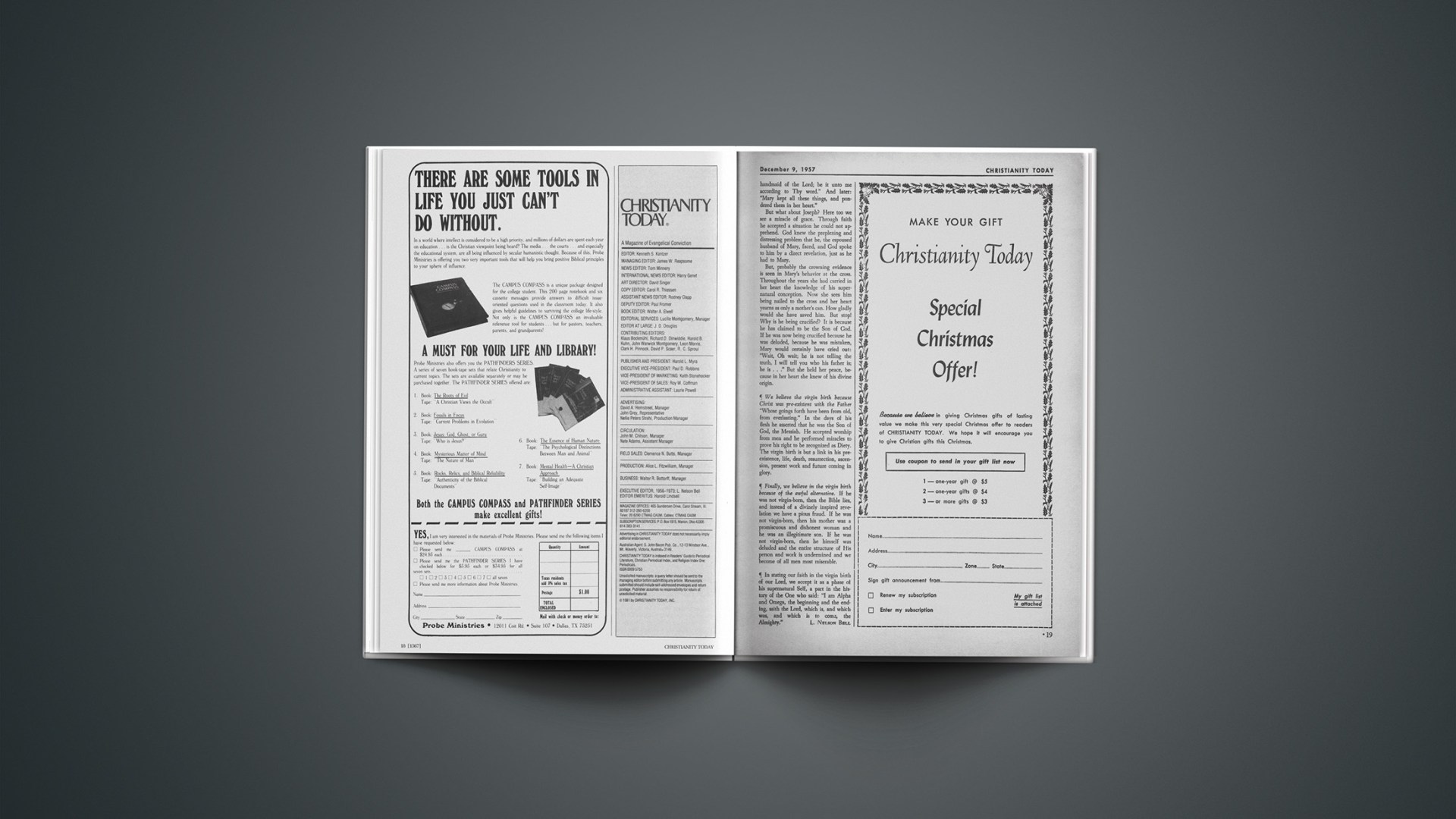The Book of Revelation is undoubtedly the most mysterious and at the same time the most intriguing part of the New Testament. Its open affirmation that it deals with future events, its weird symbolism of seals, trumpets, bowls, thunders and lightnings, beasts, and angels, its strange and sometimes almost incoherent expressions have frightened some from giving it the attention it deserves. For many readers it is either a frustrating puzzle or else the happy hunting ground of fanatics. Concluding that they can find in it nothing relevant to their spiritual welfare, they avoid it completely.
Its History
Since the earliest days of the Christian era Revelation has been under discussion. It was known and circulated in the Church in the first half of the second century. Justin Martyr (c. 145) used it, and ascribed it to John, one of the apostles of Christ. Melito, Bishop of Sardis in 170, wrote a commentary on the Apocalypse. Theophilus of Antioch (c. 175) quoted from it, and Irenaeus (c. 170) in no less than five passages alluded to it and asserted that it was written by the John who leaned on Jesus’ breast at the last supper. Clement of Alexandria (c. 200), Origen (c. 250), and others concurred in accepting it as of apostolic origin and canonical.
Authorship
The authorship of Revelation was disputed first by the Alogi, a heretical sect which seems to have had no great importance, and which was probably opposed to the Apocalypse for theological reasons. A more serious objection was raised by Dionysius, an honest and competent scholar who succeeded Origen as the head of the catechetical school in Alexandria. He reasoned that John, the son of Zebedee, did not write the Apocalypse because (1) the Revelation cites the name of its author, whereas the Fourth Gospel is anonymous; (2) the concepts, vocabulary and syntax of Revelation are radically different from the Gospel; (3) the Greek of the Apocalypse is ungrammatical, whereas the Greek of the Gospel, though not always idiomatic, is generally free from errors.
Dionysius’ arguments against the Johannine authorship have persisted to the present day. Eusebius, the great church historian of the fourth century, regarded the canonical status of the Apocalypse as doubtful, though he did not reject it utterly. In recent times R. H. Charles concluded that the Fourth Gospel and Revelation are not by the same author. Many modern scholars deny the apostolic authorship of Revelation completely.
On the other hand, there are a number of words and concepts, such as “word of God” as a title of Christ, “witness,” the concept of the “Lamb,” and some others that characterize both John and the Revelation, and are common to no other writings of the New Testament. Some of the grammatical irregularities can be explained by the use of fixed titles treated as indeclinable nouns. The writer may at times have used ungrammatical expressions, but he did not do so habitually. When he violated some rule of grammar, he did so because he had a purpose in mind, not because of ignorance.
Literary Form
A deeper cause than uncertainty of authorship has prompted some to reject Revelation. It belongs to the general class of apocalyptic literature, which employs highly symbolic language and which stresses the supernatural intervention of God in the affairs of men. For this reason it has been branded as wholly fanciful and unreal, and has been dismissed simply as a piece of wishful thinking, a lurid picture of the much desired triumph of right over wrong which has not yet been literally realized, and probably never will be. Truth, however, is not made or unmade by the literary form through which it is expressed; and in this case the Apocalypse differs from the ordinary Jewish apocalyptic writing in several ways. Although it possesses the usual characteristics noted above, it is not pseudonymous. It was written to seven actual churches in seven well-known cities, and its emphasis on practical ethics is different from the general trend of apocalyptic works.
Author
Internal evidence concerning the author shows that his name was John, and that he was a familiar figure among the churches of Asia to whom the Apocalypse was first sent. He calls himself their brother (Rev. 1:9). He had lived among them long enough to share in the persecutions and trials which they had endured for Christ. At the time of writing Revelation he was in the island of Patmos, probably as a prisoner of the Emperor. While immured there, he saw the visions of which the book speaks, and he committed them to parchment.
Date
Various dates of writing have been proposed, but the best choice seems to be about A. D. 95, near the close of the reign of Domitian. Irenaeus, Victorinus, Eusebius and Jerome all agree that it was written at that time, and the internal evidence tends to support their testimony. The fact that several of the Asian churches had backslidden demands time enough for their rise and fall. If they were founded in the active ministry of Paul, between A. D. 50 and 60, it is doubtful if the Revelation could have been written as early as the reign of Nero in A. D. 65. By Domitian’s time a second generation would have arisen concerning whom the charges of having left their first love and of harboring false teachers, or of having grown self-satisfied and lukewarm, would be more easily true. It probably marks the beginning of outward tension between the Church and the empire which eventuated in the persecution of the second and third centuries.
Interpretation
The interpretations of Revelation have been almost as numerous as its expositors. Generally they may be divided into four classes: the futurists, who regard all of Revelation beyond the third chapter as future, belonging to the period immediately preceding the advent of Christ; the historicists, who interpret the sequence of seals, trumpets, and bowls as depicting the entire course of history from the close of the apostolic age until the end of time; the preterists, who interpret Revelation as a figurative representation of the conflict between the Church and the empire at the end of the first century; and the idealists, who divest the prophecy of any chronological significance, and who make it simply a symbolic picture of the eternal conflict of the righteousness of God and the machinations of Satan.
While not all of these interpretations can be final, there is a measure of truth in each of them. The futurist can claim rightly that “the things which must be hereafter” (4:1) apply to the future, or, at least, to the future of the writer. The historicist has the advantage of continuity in interpretation, rather than assigning the bulk of the book to one narrow period in the remote future. The preterist recognizes the relevance of Revelation to the day in which it was written, and attempts to show how the symbols and thought are rooted in the history and vocabulary of the first century. The idealist tries to maintain the spiritual emphasis of the book with its theological and ethical teachings, rather than to lose himself in a maze of inexplicable details.
Structure And Content
The best approach to Revelation, however, is through its internal structure. If the book were to have any meaning for the churches to whom it was first addressed, it must have been sufficiently plain for them to comprehend its main message, even though details would have to be studied and absorbed gradually. How would they have understood it?
Revelation can be divided naturally into six main sections. The first of these, the Prologue (T. 1–8) contains the introductory details. It is organized like the title page of a book. The title, “The Revelation of Jesus Christ,” announces the subject. The book is primarily concerned with the person of Christ as he relates himself to the events of the future. The method of impartation of this revelation is indicated by the word “signified,” which means literally to declare by symbols, or to respond as an oracle would to an inquirer in enigmatic language. The word is used three times in the Gospel of John about Jesus’ death (12:33, 18:32, 21:19), and in each instance it means the figurative statement of a predicted fact. In the introduction to Revelation it conveys the idea that the content of the book will be symbolic, and that it will deal with realities.
The name of the author is the next item on the title page, coupled with the statement that he “bare record of the word of God and of the testimony of Jesus Christ, and of all things that he saw” (1:2). The language is that of the Fourth Gospel, and one cannot avoid the feeling that the writer sought to identify himself by his previous work, which was presumably known to the churches of Asia. He acted as the messenger of Christ, and he claimed only subordinate authority (22:10). Nevertheless he expected that the words of his book would be heard and obeyed as the very message of God.
The destination was the seven churches of Asia. Just why these seven should have been selected is not stated. There were more than seven churches in Asia by the end of the first century. Perhaps these were chosen because they were representative of different types which existed then, and which collectively make a picture of the churches of the entire age to follow.
The greeting from the Triune God, the eternal Father, the sevenfold Spirit, and the redeeming Son, sets the doctrinal tone of the book. Redemption is stressed in Christ’s character, “the faithful witness, the firstbegotten of the dead, the prince of the kings of the earth”; in Christ’s work, “he loved us … loosed us … made us”; and in Christ’s prospect, “Behold, he cometh with clouds.…” The seventh verse declares unmistakably that the theme of Revelation will be Christ’s return, which will complete and crown his redemptive work for men.
The eighth verse, the last of the Introduction, is like the publisher’s name on the title page. It declares God’s approval of the work and his responsibility for it.
The main body of the book is divided into four visions, each of which is introduced by the phrase, “… in the Spirit” (1:10, 4:2, 17:3, 21:10). “In the Spirit” does not mean “a spiritual attitude,” but rather refers to the control of the Holy Spirit over the mind and person of the author so that he was transported in mystic fashion to the surroundings which he describes. The first states that he was “in the island that is called Patmos” (1:9), a definite geographical location; the second, that he was called up to heaven where he saw a throne set (4:1, 2); the third, that he was removed to “a wilderness” (17:3); and the fourth, that he was placed in “a mountain great and high” 21:10).
The four divisions consist of two balanced pairs. Each member of the first pair is introduced by “a great voice” (1:10, 4:1), and each member of the second pair by “one of the seven angels that had the seven bowls” (17:1, 21:9). These contrast the divine discipline of the churches and the judgments on the world. The second couple contrasts the fall of Babylon, representing the spiritual organization of godless civilization and the ultimate perfection of the Bride, the heavenly Jerusalem, which is the perfected community of the redeemed.
Furthermore, each of the divisions in Revelation marks some aspect of the character of Christ as he brings redemption to perfection. Perhaps this can he stated best in a brief outline:
Prologue: Christ Communicating 1:1–8
Vision I: Christ in the Church 1:9–3:22
Vision II: Christ in the Cosmos 4:1–16:21
Vision III: Christ in Conquest 17:1–21:8
Vision IV: Christ in Consummation 21:9–22:5
Epilogue: Christ Challenging 22:6–21
The progress of the outline is evident in the text. As already noted, the Prologue states that the entire book will be occupied with the Revelation of Jesus Christ which God gave to him to communicate to his servants. This revelation carries the work of redemption into the future, and purports to show what the final scope and effect of salvation will be. Grounded in the pivotal events of Christ’s death and resurrection, the purpose of God will be carried forward in the process of human history until evil is overcome and the Kingdom shall be finally established. So certain is this outcome that the Prologue states the fact as past: “he made us to be a kingdom, priests unto his God and Father …” (1:6, ARV).
The first vision opens with a portrait of Christ clothed in priestly garments, moving among his churches on a tour of inspection. Their weaknesses and their virtues are typical of the Church of all ages. Reproof and commendation are given to all in proportion to their respective merits. It is noteworthy that the future advent of the Lord which seems indefinite in the letter to Ephesus, “… or else I come to thee” (2:5, ARV), is in the letter to Laodicea an imminent fact, “… Behold, I stand at the door and knock” (3:20). The first message of the book is to the Church, for “judgment must begin at the house of God.”
The second vision deals with the world-process of judgment, administered by God’s delegated agent. Two symbolic words dominate the thought of this section. The vision is set in heaven, but the focus of attention is not fixed on the surroundings but on the throne, in relation to which all other figures are located and from which proceeds the action of judgment. In this way the sovereignty of God over the affairs of the world is asserted. The deputy of this sovereignty is “a Lamb as it had been slain,” who takes from the right hand of the Occupant of the throne the seven-sealed scroll which gives him the authority to exercise judgment upon the earth. “Lamb” emphasizes the sacrificial aspect of Christ. He is the enduring Atonement for sin upon whom the divine judgment has already fallen, and because he has made Atonement he is capable of bringing the final victory over evil.
The entire section that follows is given over to cataclysmic judgments through which the people of God are miraculously preserved, and by which the culminating organization of evil—political, social, economic, and religious—under the domination of the “Beast,” is finally crushed. Revelation presents the current world process as a titanic struggle of supernatural forces in which human governments, societies and religions are involved, and which will eventuate in a climactic rebellion against God, terminated by the advent of Christ in judgment.
The final aspect of this judgment which is the climax of redemption is told in the two remaining visions. Christ in Conquest (17:3–21:8) reveals the Word of God on the white horse, judging and making war in righteousness. The fall of Babylon, the city in which organized wickedness reaches its fullest manifestation, the destruction of the beast and his armies who have rebelled against God, the imprisonment of Satan for a thousand years, his release and final doom, the millennial reign of Christ, and the introduction of the city of God fulfil the purpose of redemption.
In contrast to this vision of the overthrow of evil, the last vision (21:9–22:5) reveals Christ in Consummation, the everlasting joy of his redeemed people. The term “Lamb” is reintroduced, evidently as a reminder that redemption will be the basis for the eternal state and its chief delight. The city of God, with streets of gold and gates of pearl, may be figurative; but if so, the language is an attempt to describe the indescribable—God’s ultimate destiny for his people. Seven negations contrast this city with the cities of men as they were known in the ancient world: (1) no temple, (2) no sun or moon, (3) no closed gates, (4) no uncleanness, (5) no curse, (6) no night, (7) no artificial light. In contrast to each of these points the Lamb supplies a true worship, a true light, an open welcome, a holy populace, the blessing of his presence, and the eternal illumination of the presence of deity. The New Jerusalem will restore to the saved all the blessings that man lost by his sin in Eden.
The Epilogue (22:6–21) focuses the theme of the book in one climactic appeal. The threefold repetition of the theme, “I come quickly,” with its accompanying exhortations, challenge the will to obey, the moral nature to prepare for Christ’s coming, and the emotional desire to see the Lord. It makes all the preceding text the practical foundation for an attitude of readiness and alertness in view of Christ’s promised return.
Tools For Study
Commentaries and expositions of Revelation are almost numberless. The most complete critical work on the Greek text are the two volumes on Revelation by R. H. Charles in the International Critical Commentary. Charles was the most learned scholar of recent times in the field of apocalyptic literature, but his literary criticism was radical. Swete’s commentary is not quite so exhaustive as Charles’, but it is thorough. William Lee’s commentary on Revelation in The Bible Commentary is helpful to the student who wants discussion of detail. The earliest and the most popular of the premillennial futurist commentaries is J. A. Seiss’ Lectures on the Apocalypse. A more recent volume in the same category is Wm. R. Newell’s verse-by-verse exposition. Milligan’s treatment of Revelation in Schaff’s Popular Commentary on the New Testament is both scholarly and practical. The most recent general conservative commentary is The New Bible Commentary by Davidson, Stibbs and Kevan. Its discussion of Revelation is necessarily brief, but it is up to date. Sir William Ramsay’s Letters to the Seven Churches of Asia contains a wealth of material by an expert archaeologist on the historical setting of Revelation. It is hard to say which is the best commentary on Revelation, since each one has a different approach, and since many may excel in different ways.
There is no easy road to an understanding of Revelation, but prayerful acceptance of what one does understand, with equally prayerful meditation on what one does not understand, will bring a growing appreciation of this book which after all has the same theme as the rest of the New Testament—the person of Christ.
MERRILL C. TENNEY
• The procedure followed in the above article is developed much more fully in Dr. Tenney’s recent volume, Interpreting Revelation.—ED.












